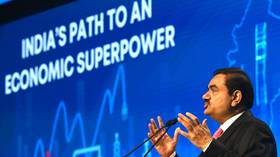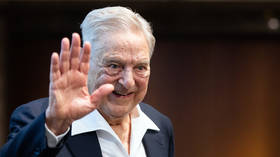India’s second-richest man rejects allegations by Soros-backed platform

Adani Group, chaired by India’s second-richest man Gautam Adani, on Thursday categorically rejected allegations of stock-trading violations made by the Organized Crime and Corruption Reporting Project (OCCRP), an international investigative platform known for its work on the ‘Panama papers’ and ‘Pandora papers’.
In a new report alleging stock manipulation by Adani Group, the OCCRP claims that millions of dollars were invested in some publicly traded shares via “opaque” Mauritius funds linked to business partners of the Adani family.
“These news reports appear to be yet another concerted bid by Soros-funded interests supported by a section of the foreign media to revive the meritless Hindenburg report,” the company said. It added that “these attempts are aimed at, inter alia, generating profits” by driving down the company’s stock prices. In the wake of the new report, shares of listed Adani Group companies dropped by over 2% on Thursday.
Earlier this year, a report published by US-based short-seller Hindenburg Research accused Adani Group of “improper business dealings.” Describing the entity as “highly overvalued,” the report claimed that it had “engaged in a brazen stock manipulation and accounting fraud scheme over the course of decades.”
Adani Group has denied the allegations and said the Supreme Court Expert Committee studying Hindenburg’s report found no evidence of stock-price manipulation by the company. However, the report triggered a stock-market rout that cost Adani Group about $145 billion in market value at its lowest point. It also saw Gautam Adani’s personal fortune plunge by as much as $69 billion, or nearly 60%. He remains in 24th position in Forbes’ Real-Time Billionaire list, however, with a personal fortune of $53.5 billion as of August 31.
The OCCRP investigation, details of which first appeared in the Financial Times and The Guardian, builds on the Hindenburg allegations and accuses the Adani family of “secretly investing hundreds of millions of dollars into the Indian stock market, buying its own shares.”
The OCCRP report names two individuals, Nasser Ali Shaban Ahli and Chang Chung-Ling, who it claims had “longtime business ties to the family” and have also served in companies associated with Vinod Adani, the brother of Gautam Adani. These associates, as revealed by offshore financial records, “spent years buying and selling Adani stock through offshore structures that obscured their involvement — and made considerable profits in the process,” the report said.
Market rules in India require that at least 25% of the stock in listed companies should be available for public purchase, and any breach of that requirement should be investigated by the stock market regulator, the Securities and Exchange Board of India (SEBI).
After the publication of the OCCRP report, Hindenberg Research took to X (formerly Twitter) to say that the “loop is closed.” It claimed that offshore funds owning at least 13% of the free float in multiple Adani stocks were secretly controlled by associates of Vinod Adani, masking the relationship with two sets of books.
The OCCRP is a non-profit global network of investigative journalists. It is funded by a host of government and non-government organizations, including the Rockefeller Brothers Fund and Open Society Foundation (OSF) of the American investor-turned-philanthropist George Soros, who previously raised questions about links between Indian Prime Minister Narendra Modi and the Adanis.
In February, Soros targeted Modi in a public speech and said the Indian prime minister was “no democrat” before going on to claim that “Modi and business tycoon Adani are close allies; their fate is intertwined.” The billionaire’s criticism of Modi drew sharp objections from political leaders affiliated with India’s ruling party, the BJP, with External Affairs Minister S. Jaishankar lambasting Soros as “old, rich, opinionated and dangerous.”














